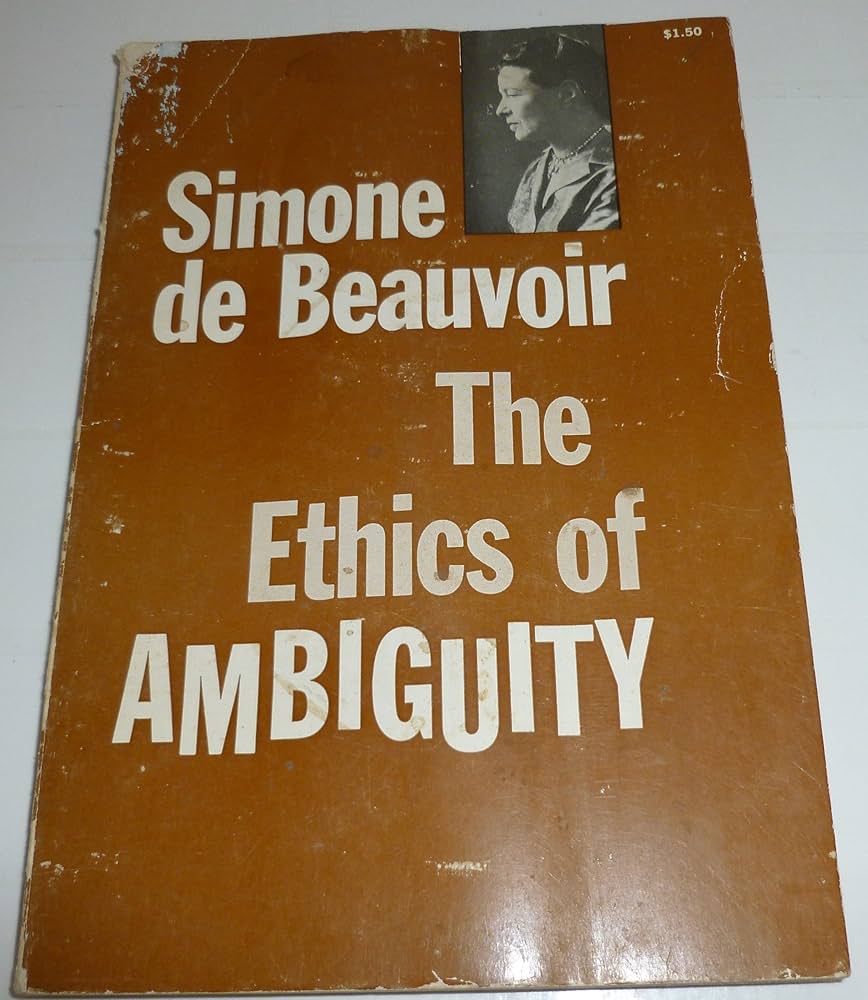
Table of Contents
Buy as E-book, Paperback, or Hard-cover
A Bold Voice in Existentialist Ethics
In The Ethics of Ambiguity (1947), Simone de Beauvoir carves out an urgent and original ethical framework within the existentialist tradition—one that extends, challenges, and clarifies Sartre’s radical ideas by infusing them with concrete moral demands and a uniquely lucid voice. Written in the shadow of war and resistance, de Beauvoir’s work insists that freedom is not merely a condition—but a responsibility toward others.
This slim but potent volume remains one of the clearest articulations of existentialist ethics, grounded not in abstract speculation but in lived experience and political clarity. De Beauvoir anchors her arguments in the reality of ambiguity, where moral certainty is elusive, but action remains essential.
Core Themes: Ambiguity, Freedom, and Responsibility
1. The Human Condition is Ambiguous
To exist is to live as both subject and object, both free and factical, both individual and social. We are creatures of contradiction, shaped by contingency yet capable of transcending it. Ambiguity is not a flaw but the condition for ethics.
Unlike moral systems that seek clarity through rigid principles, de Beauvoir asserts that only in ambiguity can we live truthfully and morally. Ethics must grapple with uncertainty, not avoid it.
2. Freedom is a Shared Burden
Freedom is not solipsistic; it cannot be realized in isolation. To will oneself free, one must will others free. Thus, my freedom is bound up with yours.
This insight rejects both nihilistic individualism and collectivist determinism. It positions ethics not as abstract duty but as a concrete political imperative: the fight for freedom must be waged in solidarity.
3. Rejecting the Serious Man
De Beauvoir critiques the “serious man” who submits to fixed values or systems—religious, nationalistic, ideological—as a way of escaping responsibility. Whether priest or party functionary, the serious man abdicates freedom under the illusion of moral clarity.
True ethical living demands the courage to confront ambiguity, to act without guarantees, and to accept the burden of decision-making.
Philosophical Contributions: Ethics Reimagined
Where Sartre focuses on ontology and individual freedom, de Beauvoir roots ethics in intersubjectivity, showing how personal responsibility extends into political realms. She anticipates later feminist and postmodern critiques by:
- Reframing ethics as situated and relational
- Demanding engagement with social oppression and gendered constraints
- Providing a woman’s voice in a field dominated by men, without relying on essentialism
She also distinguishes various “types of evasion” (sub-man, serious man, nihilist, adventurer) to show how people flee from freedom—and how these failures of moral courage shape history.
Historical and Political Resonance
Written after her experiences in the French Resistance, de Beauvoir’s ethics are not armchair musings—they arise from political struggle and existential peril. The text is deeply concerned with real-world oppression, particularly fascism, colonialism, and sexism.
Her call to embrace ambiguity while fighting for freedom is not just philosophical—it is a rallying cry for engaged, moral action in the face of injustice.
Strengths and Limitations
Strengths:
- Clarity and conciseness in philosophical writing
- Ethical theory grounded in real-world ambiguity
- Intersection of personal freedom and political resistance
Limitations:
- Abstract passages may challenge casual readers
- Assumes familiarity with existentialist vocabulary
- Less emphasis on structural analyses of power than later feminist ethics
Who Should Read It?
- Philosophers exploring moral frameworks beyond Kantian or utilitarian ethics
- Feminists and humanists seeking a rigorous ethical voice from a woman
- Readers of Sartre who want ethics with clarity and conscience
- Activists and thinkers grappling with moral complexity in real life
TL;DR
The Ethics of Ambiguity is not a detached treatise—it is a roadmap for moral clarity in a murky world. In de Beauvoir’s hands, existentialism becomes not an excuse for despair, but a call to act responsibly, even when no system guarantees we are right. Her ethics are courageous, situated, and—most importantly—human.
Leave a Reply